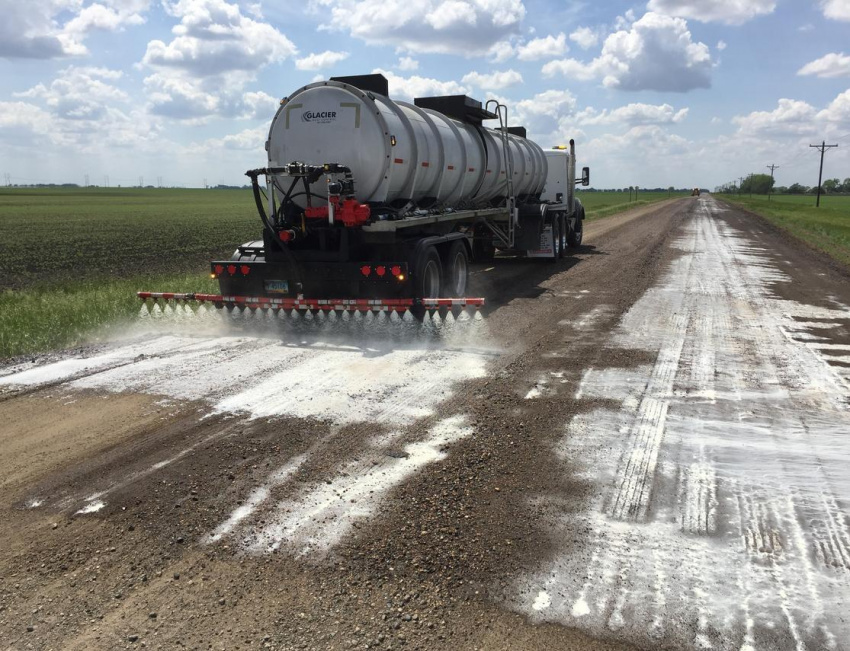Innovative Soy-Biobased Dust Suppressant Helps Clear Air and Deters Respiratory Issues

Soy checkoff research collaboration with the North Dakota Soybean Council created a soy-biobased dust suppressant that will drive soy demand, improve air quality and reduce dust-related health and safety risks in communities nationwide.
ST. LOUIS (April 22, 2021) — A new soy-based dust suppressant is now available for roads, construction sites, farms and more, offering a sustainable choice for rural, urban and business communities to improve air quality for people, pets, livestock and crops. A newly released video shows how this innovation can help reduce dust on rural gravel roads near farms nationwide.
BioBlend Renewable Resources’ EPIC EL dust suppressant is the latest industrial use product to enter the market after having received research funding from the United Soybean Board and North Dakota Soybean Council. With soy checkoff support, a North Dakota State University (NDSU) research engineer created the base chemistry that BioBlend is commercializing. BioBlend Renewable Resources will begin marketing EPIC EL nationwide in April 2021 after finalizing a license agreement with the NDSU Research Foundation. EPIC EL is made from soybean oil as well as glycerin, a coproduct of biodiesel production.
“The soybean checkoff is driving demand for U.S. soy through innovative and sustainable industrial use products,” said Dan Farney, United Soybean Board Chair and soybean farmer from Morton, Illinois. “A long-lasting soy-biobased dust suppressant is a natural choice for farmers, county engineers and government agencies, as well as businesses in rural and urban areas, to improve air quality, traffic safety and sustainability.”
The Environmental Protection Agency (EPA) as well as the American Lung Association has recognized the importance of dust control due to its negative implications on the respiratory system.
“Short and long-term exposure to air pollutants, such as dust, is associated with a number of adverse health impacts. For instance, short-term exposure to air pollutants can negatively impact lung function and exacerbate preexisting conditions like asthma and heart disease,” said Bailey Arnold, senior manager of clean air initiatives with the American Lung Association. “Long-term exposure to air pollutants is also associated with chronic bronchitis, reduced lung function, increased morbidity and mortality rates for lung cancer and heart disease, and heightened susceptibility and mortality to infectious diseases, such as COVID-19.”
Because EPIC EL is an odorless water-soluble product, it also offers environmental benefits compared to the salt-based mixtures commonly used to control dust that trigger concerns about soil leaching and equipment corrosion. Use of soybean oil qualifies BioBlend’s EPIC EL for federal procurement under the USDA BioPreferred Program.
According to the Federal Highway Administration, 35% of the nation’s roads, more than 1.3 million miles, are unpaved. Dust created by vehicles traveling on these roads equates to about one ton of lost gravel per vehicle per year. Maintenance is a major budget item. In North Dakota, about 66% of local roadway budgets are spent on the state’s 60,000 miles of gravel roads. A single piece of equipment used to blade these roads costs more than $250,000.
Not only does less dust equate to better economic value in gravel preservation, but it also means safer roadways and potentially fewer car accidents because of better visibility.
“When we look at vehicles going down the road, and we see dust going up, that dust is about a ton of material per vehicle per year per mile that we lose,” said Dale Heglund, North Dakota State University’s Upper Great Plains Transportation Institute (UGPTI), and North Dakota Local Technical Assistance Program (NDLTAP) director. “It goes onto the crops. It goes into the homes. It goes off the roadway, and we have to replenish it. When you use products like EPIC EL dust suppressant that hold that surface together, we’re not only improving the safety of the roadway, but we’re improving the gravel preservation. We’re keeping it in place. The investment that we made stays there longer.”
Visit unitedsoybean.org, ndsoybean.org or soybiobased.org to learn more.
About United Soybean Board: United Soybean Board’s 78 volunteer farmer-directors work on behalf of all U.S. soybean farmers to achieve maximum value for their soy checkoff investments. These volunteers invest and leverage checkoff funds in programs and partnerships to drive soybean innovation beyond the bushel and increase preference for U.S. soy. That preference is based on U.S. soybean meal and oil quality and the sustainability of U.S. soybean farmers. As stipulated in the federal Soybean Promotion, Research and Consumer Information Act, the USDA Agricultural Marketing Service has oversight responsibilities for USB and the soy checkoff. For more information on the United Soybean Board, visit unitedsoybean.org.
###
Contact:
Paul Murphy-Spooner at United Soybean Board, 515.975.6584.
Mace Thornton at United Soybean Board, mthornton@unitedsoybean.org.
